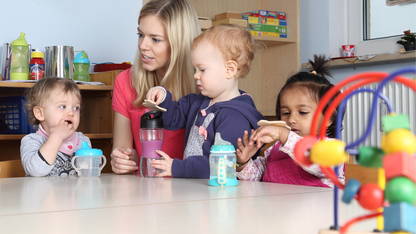When you’re new to a community, locating a person or program to provide child care for you is not the easiest of tasks. Due to expanding demand, just finding an opening may be difficult. Pinpointing a place that is not too far or too expensive and, most importantly, a provider whom you trust, may take days or weeks of persistent phoning and visits.
As a parent, it is your responsibility to ensure that your child is safe and happy in a child care environment that is fun, educational, and nurturing. You will need to consider many questions. But you are not alone — an increasing number of parents rely on quality child care so that they may work. About 70% of parents place their young children in some type of daily care. Knowing in advance that this is not an overnight process makes it a bit less overwhelming.
Types of Child Care
You might like the home-like feel of a family child care home, or maybe you want your child to have opportunity to socialize with peers in a larger child care center. You might be looking for after school care for your child, a summer camp experience or a program that can accommodate his or her special needs. It will help you in your search to learn more about each type of child care setting.
In-Home
Some parents may prefer the one-on-one contact an in-home care provider can offer, especially for an infant. The International Nanny Association (INA) recommends that you interview any prospective hire at least twice and that you conduct a criminal background check, which is usually done by most placement agencies.
One key to good child care is whether the caregiver can adapt to the needs of each child and family. Not all children of the same age are at the same level of development; each child has unique character traits. A good caregiver understands these personal and developmental differences and creates a program to meet each child’s needs.
Center-Based Care
The most popular type because there are so many options for children of all ages. You take your child to a place that is organized and staffed specifically to care for a group or groups of children. Some types include day care centers, preschool programs, before/after school programs.
Day Care Center
If you’re considering a day care center or another group setting, you should spend some time observing the center and talking to parents with children in the center. You should also expect that your child will be assigned to the same caregiver to promote a sense of security and consistency. Inquire about the rate of staff resignations; low staff turnover minimizes the need for young children to repeatedly adjust to new caregivers.
Preschool Programs
Preschool programs are offered through Head Start, child care centers or local public and private schools. They can be offered as a half-day program for three or four days a week or they can be part of a full day program at a child care center.
Before/After School Programs
These programs give children additional time and opportunity to engage in hands-on enrichment activities in reading, science, math, art, drama, and specific “safety” topics that include conflict resolution and drug abuse. Most programs offer homework assistance and some offer tutoring. Most also provide supervised physical activity and healthy snacks, or even dinner. School age programs are often provided through local schools, child care centers, churches, or youth-oriented community organizations. Quality features include opportunities for children to make individual and group choices about activities, opportunity to improve academic skills, spaces for children to relax and rest, well supervised spaces where they can be active, nutritious snacks, and parental involvement.
Choosing Child Care
In addition to the forms of child care, you want to take into account the following factors:
- Age and personality of your child.
- Child care needs of all the children in your family.
- Location of your workplace, home and child care facility.
- Hours you need child care.
- What you can afford.
When you begin your search, start with the telephone. Plan to spend a few minutes with each call. Describe your needs and ask about the program, staff, location, other children in care, and what is included in the cost. Make an appointment and visit the center, school or home, and plan on spending at least an hour at each place. Visit once to observe the children in care and at another time outside of regular structured hours to spend time with provider or director.
In any group center, health, safety, and hygiene must be given priority in all settings. All children and staff members should have current immunizations; staff should have clear criminal background checks. The facility must be child-proof and all staff members should wear disposable gloves when changing diapers. Toys should be disinfected on a regular basis and frequent hand washing should be promoted among the staff and children to minimize the spread of infection.
Preparing Your Child for Child Care
Most young infants, up to seven months, adapt to caring adults and seldom have problems adjusting to good child care. Older infants may be upset when left with strangers. They may feel separation anxiety, which is a normal part of development for some children. They will need extra time and your support to “get to know” the caregiver. Some children show changes in behavior when they start child care. Toddlers may cry, pout, refuse to go to or act angry in other ways. Preschoolers may regress and behave like a younger child. They may be more wakeful at night. This behavior usually goes away after a few days or weeks in high-quality child care, just be sure to monitor.
You may help your child adjust to a new child care arrangement. Arrange a visit with in-home caregivers while you are at home or when you need child care for a short time. Visit the center or family child care home that you have chosen with your child before beginning care. Show your child that you like and trust the caregiver.
Some children like to carry a reminder of home when they go to child care. A family photograph or small toy can be helpful. Talking to your child about child care and the caregiver is helpful. Being prepared makes any new experience easier for children. There also are storybooks about child care that you and your child can read together. (Check with your local library, another great outing for a parent and child)
After a child has been in child care, a sudden change in caregivers may be upsetting. This can happen even if the new caregiver is kind and competent. If you are concerned about your child’s feelings, you may want to arrange a meeting with the caregiver or ask your pediatrician for advice. Parents need to help the caregivers and the child deal with any changes in the child’s routine at home or child care. High-quality child care helps children grow in every way and promotes their physical, social and mental development. It offers support to working parents. Your pediatrician wants your child to grow and develop with enjoyment in a setting that supports you as a parent.
In the final analysis, locating a child care provider with whom you are confident is well worth the searching. Why? Your child benefits greatly from such an arrangement, meeting and interacting with other children and adults. The child learns and grows from experience, often times a major step in establishing independence and becoming his or her “own person.” And you feel more at ease leaving them.
For more information you may want to visit the following website: American Academy of Pediatrics, www.aap.org



